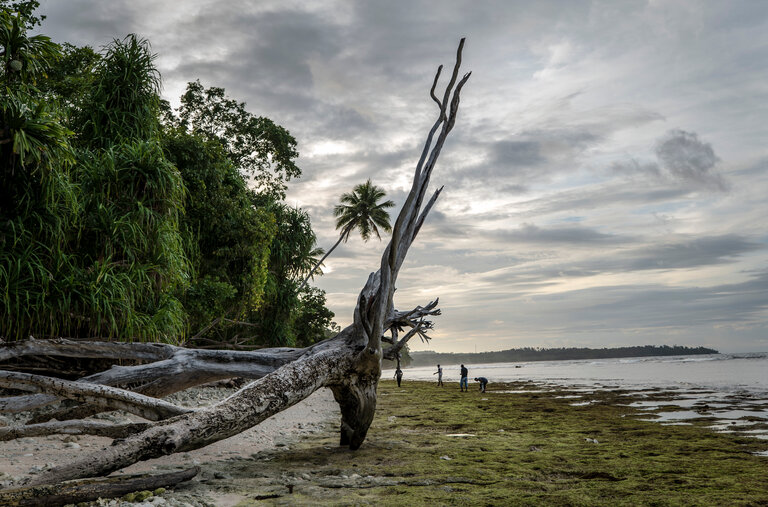For 15 generations, members of the Abrauw clan have maintained a lifestyle that is quite similar to that of their forefathers. Using wooden ploughs to cultivate in parts of rainforest, they collect medicinal herbs and set traps to capture snakes and wild boar, among other things.
To them, the land they inhabit on Biak island is absolutely everything: it serves as their identity, as a source of sustenance, and as a connection to their ancestors. However, the little clan is now concerned that it may lose its position in the world as Indonesia continues its long-standing goal to become a member of the space age.
Several decades ago, the Indonesian government claimed to have bought 250 acres of the clan’s ancestral property, and it has been planning to construct a small-scale spaceport there to launch rockets there since 2017. Clan chiefs claim that the project will compel them to leave their homes.
Last year, Indonesia’s president, Joko Widodo, personally sold SpaceX creator Elon Musk on the concept of launching rockets from Indonesia, although he didn’t specify which location he was talking about. Mr. Musk has not yet committed to a transaction or made any public statements about it. However, the likelihood of his participation has prompted a rush of action on the part of Biak authorities to market the site, as well as fresh resistance from the island’s indigenous population.
It is part of Mr. Joko’s effort to modernise the Southeast Asian island country by building new airports and power plants, as well as building new roadways and bridges, sometimes with little concern for the environmental effects. A component of the country’s historic history of utilising unethical tactics to acquire property from Indigenous people, which has left certain tribes impoverished while enriching important Indonesians and multinational corporations, is also at play here.
The Abrauw clan, one of 360 clans on Biak, is on the verge of extinction, with just around 90 people left. The majority of them reside in the hamlet of Warbon, which is located on the island’s northeastern edge, approximately a mile and a half away from the projected spaceport.
Across the street, waves lap softly on the white beach as butterflies fly through the tree’s limbs, including black, brown, and white butterflies. Clan members regard the tree to be holy, and they believe it represents the beginning of the Abrauw. They come to the tree on a regular basis to give sacrifices and pray to their ancestors. On rare occasions, they congregate there and camp for many days. If the spaceport were to be constructed, the tree, as well as the beach where the Abrauw go fishing and the forest where they cultivate, would be off-limits to the public.
Some clan members have found employment in other regions of Indonesia, but those who stay in Warbon rely mostly on the fish they catch and the taro, cassava, and sweet potatoes they farm to supplement their income. Rather than permanent farming, the tribe engages in nomadic farming, cutting trees from the forest to plant crops in a different area every two years.
The Pniel Evangelical Christian Church, located in the neighbouring settlement of Korem, is visited by those who walk or ride motorcycles there. Warbon is also home to members of the Abrauw who have married into other clans. The spaceport is also opposed by the Catholic Church.
Officials in Indonesia who favour the project claim that Biak, which is located only 70 miles south of the Equator and faces the Pacific, would be a perfect location for rocket launches. SpaceX intends to launch tens of thousands of communications satellites into orbit over the course of the next few years.
In an attempt to court Mr. Musk, Mr. Joko offered that his automobile firm, Tesla, join with Indonesia to manufacture electric vehicle batteries, pointing out that Indonesia is the world’s biggest supplier of nickel, which is a critical component. According to authorities, a team from SpaceX visited Indonesia early this year to explore the possibility of collaborating.
In February, Tesla filed a proposal to the Indonesian government for battery manufacture, but the ministry refused to provide any specifics. Requests for response from the media were not returned by Mr. Musk or his firms. Mr. Joko strengthened the space programme in September by raising its budget by a factor of twenty and transferring it to the new National Research and Innovation Agency, which now reports directly to him.
In a personal visit to the Biak site last month, Laksana Tri Handoko, the agency’s chairman, said that the island was still a feasible option, but that the enormous spaceport he envisions would need a tenfold increase in land area.
The space agency has maintained for decades that it purchased the 250-acre land from the Abrauw family in 1980. The clan, on the other hand, claims that the property was never sold. According to clan chiefs, four persons who signed a paper granting the agency the title were not clan members and thus did not have the authority to sell.
They said that the older generation was too afraid to speak out since the Indonesian army was conducting military operations in Biak and anybody who challenged the government might be imprisoned as a separatist, according to them.

